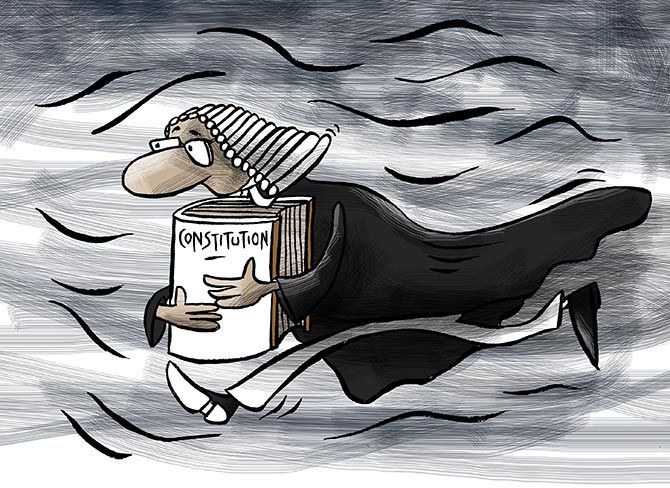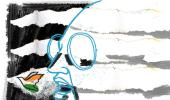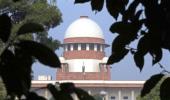'After each election the losers troop to the court with various objections. The general election will not be different.'
'It could be worse if there is no clear majority and the President has to invite the party with the largest number to form the government,' points out M J Antony.
Illustration: Uttam Ghosh/Rediff.com

Judges and schoolchildren enjoy the maximum number of holidays in a year (about 175) and it is justifiable as both of them carry loads of homework. The introduction of QR codes in textbooks is expected to reduce the burden on the back of the students, and obviate the need for exoskeletons in future.
But the tons of paper overflowing into the corridors of the Supreme Court have belied the promise made by the then Chief Justice that the courts go 'paperless' from July 3, 2017. In fact, the court has taken over half of Pragati Maidan acres to accommodate its dog-eared papers. The judges still carry paper files and books in carloads to their homes.
After four hours in the courtroom hearing arguments, writing judgments is their homework. Last year, Supreme Court judges have written nearly 6,000 printed pages of judgments.
This is also a season to introspect over the events of the tumultuous year. In Dickensian terms it was the best of times, it was the worst of times. The court delivered epoch-making judgments as in the Aadhaar case, in which the Right to Privacy was extended to various aspects of citizens's lives.
Realtors have been sent to jail for defrauding middle class aspirants for a roof over their heads.
LGBT won their long fight for recognition and dignity.
Adultery was declared to be no crime.
Attacks on freedom of expression like agitation against films were valiantly resisted.
Women were allowed entry into the Haji Ali dargah in Mumbai under the court's pressure.
The court allowed young women to visit the ascetic deity in Sabarimala.
Triple talaq was declared unconstitutional.
We no longer need to sing the national anthem at the start of a Bollywood flick.
2018 also saw the worst period since the 1975 Emergency when the judiciary was torn apart with dissensions within and pressures from outside. Last year began with the revolt of four senior-most judges of the Supreme Court against then Chief Justice Dipak Misra. There was an abortive attempt to impeach him.
When the storm was dying down, there was a tailwind when one of the rebel judges, after retirement, justified the open rebellion as the last resort since the CJ was 'remote-controlled' by unnamed forces from outside.
The new CJ Ranjan Gogoi has brought the institution to an even keel for the moment, though how far he can cruise peacefully is doubtful.
There are reasons to fear turbulence in the coming months. The Sabarimala issue, which rocked not only Kerala but also the souls of religious minded people who form the majority in this country, is set to reopen. The authority of the court has never been challenged to this extent so far.
Even more ominous is the Ayodhya issue which has been shelved for the time being.
There are nearly 20,000 pages of documents in eight different languages including Hindi, Sanskrit, Urdu, Persian, Pali and Arabic. It would require divine intervention to get a final judgment early, considering the pace at which property disputes are settled at the apex court.
The court has made it clear that it would look at the 13 appeals only as a property dispute, shorn of religious veneer.
What happens outside would again belong to the imponderable.
After each election the losers troop to the court with various objections. The general election will not be different.
It could be worse if there is no clear majority and the President has to invite the party with the largest number to form the government.
That would be a rare Constitutional moment when he has to take a decision on his own without the 'aid and advice' of the Cabinet. The role of governors in such situations has been challenged in the Supreme Court and many of them have not covered themselves with glory.
The judiciary must be ready to face such Constitutional imbroglios in the coming months.











